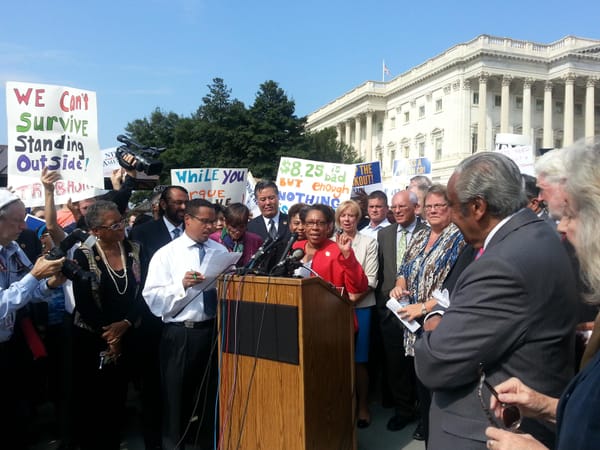The Quasi-Judicial Immigration system presents a threat to all Americans’ rights

The Quasi-Judicial Immigration system presents a threat to all Americans’ rights
In a nation of laws, the names of things and their precise definitions take on increasing importance and require increasing scrutiny. Theorists have long noted how words like ‘treason’ or ‘terrorism’ had a tendency to expand in definition so that exceptions to liberal values once made for extremely niche cases gradually become a threat the functioning of normal judicial processes more generally. The same is true of terms of we normally associate with the judiciary. The language used around immigration ‘judges’ and ‘warrants’ gives an impression of due process unsupported by the reality on the ground. As that authority gradually extends to more and more cases, Americans need to realize the danger their rights are in.
The goal of an independent judiciary
In explaining the need for the judiciary to stand independent of the executive or legislative branches, Alexander Hamilton wrote extensively in Federalist 78 about how the framers of the constitution envisioned the courts to operate. One purpose was of course to moderate the legislature when it might seek to violate the constitution and the specific rights therein – Hamilton mentioned ex post facto laws and bills of attainder specifically, the Bill of Rights not having yet been added. However, he also argues for the value of an independent court in terms of individual liberties:
But it is not with a view to infractions of the Constitution only, that the independence of the judges may be an essential safeguard against the effects of occasional ill humors in the society. These sometimes extend no farther than to the injury of the private rights of particular classes of citizens, by unjust and partial laws. Here also the firmness of the judicial magistracy is of vast importance in mitigating the severity and confining the operation of such laws.
Hamilton is drawing on an enlightenment tradition starting at least with Cesare Beccaria, whose classic On Crimes and Punishments theorized much of what we now consider due process. The logic of an independent judiciary goes deeper even that protection of constitutional rights for Beccaria; it is an essential role in any system of law:
The sovereign, who represents the society itself, can only make general laws to bind the members; but it belongs not to him to judge whether any individual has violated the social compact, or incurred the punishment in consequence. For in this case there are two parties, one represented by the sovereign, who insists upon the violation of the contract, and the other is the person accused who denies it. It is necessary then that there should be a third person to decide this contest; that is to say, a judge, or magistrate
Here we get into what legal commentators would call due process – the system of warrants, subpoenas, jury trials, legal counsel, and the like that are supposed to protect the rights of any individual suspected of a crime, from the process of evidence collecting to the sentence handed down. These are handled primarily in the 4th through 8th amendments of the Constitution and constitute the bulk of the specific rights in the Bill of Rights. For this to function, according to Hamilton and Beccaria, the judiciary that determines the facts of a case cannot be simply an extension of the legislative branch that writes the laws in the first place, nor the executive that order the police. It must be independent of both.
With this in mind, it seems obvious that handing the power to issue warrants or imprison individuals to a court that lacks this jurisdiction is a distinct problem, and creates potentially challenges to all the judicial rights Americans hold under the Constitution. However, that is exactly what is happening.
Although in reality there are substantial differences between an immigration issued administrative warrant and a true judicial warrant, helpfully explained here, the duplication of terms serves to create the impression that an administrative warrant functions like a real one, i.e. authorizes immigration authorities to violate the rights to security of a person’s property and personal effects.
Administrative warrants fail to uphold the separation of powers because they are issued by ‘judges’ who do not conform with Hamilton’s idea of the separation of powers – namely, they are not issued by an independent judge. Immigration ‘judges’, unlike those described in Article III of the constitution, can (and have recently been) fired on a whim from the President. They function as an extension of presidential power with no meaningful independence from it. They cannot protect the private rights of anyone, much less marginalized minorities.
This goes a step further when it comes to ‘deportations’ directly to prison. The fourth amendment to the US Constitution clearly demands that no person (and the word used is person, not citizen) “ be deprived of life, liberty, or property, without due process of law”. The fact that immigrants facing deportation do not receive any kind of consideration from an independent judiciary may be excused by the claim that simply by being returned to their countries of origin, they are no not being subjected to a deprivation of liberty, at least not for longer than it takes to get them on a plane ‘home’. But in the case of, for example, Venezuelans sent to El Salvador, they are being sent directly to a state where they are not citizens or residents of any sort, and immediately being deprived of liberty in gulag conditions of servitude. In this case, it is obvious that the deprivation of liberty is occurring, or at least beginning, on US territory without any true due process.
It is only a matter of time before this quasi-judiciary comes for American citizens; indeed, it is already being used to exile American children from their country of birth. It is well past time to call out immigration ‘judges’ for what they are – employees of the executive branch, serving at the president’s whim, whose lack of independence means they cannot offer substantive resistance to an ever more authoritarian executive.



